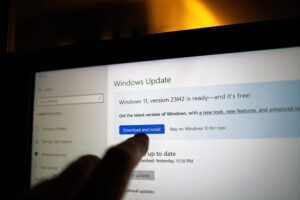Bad habits come in all shapes and sizes, and they even come in the digital variety. And these digital bad habits are just like most bad habits – hard to break, expensive, and can potentially ruin your reputation.
But which online habits are the most damaging to pick up? Here are a few to watch out for.
Where is thy passcode, sir?
There are way too many people in this world who don’t lock their mobile devices. But it doesn’t make any sense. Is it really that difficult or time-consuming to type in a few numbers or swipe a simple pattern? And if it is, is dropping a passcode really worth losing data over?
If anyone snatches one of your devices, the only thing really protecting your data is a passcode. If you don’t have one, that person will have an all-access pass to everything inside it.
Put down the mouse and step away from the clicker.
The power of the almighty click… aimed in the right direction, a simple click has the power to destroy reputations and topple an entire business. Despite this, though, people are still as clicker-crazy as ever. They click on ads that are too good to be true, click on links that are clearly malicious, and click on anything that looks even remotely clickable. Knock it off, and direct your click with a little more caution.
You remember to recycle the 3 P’s: plastic, paper, & passwords.
A password is meant to be reused, right?
That would be a ‘no.’ Passwords should not be reused, recycled, or anything else that beings with a re-. If someone gains access to one account, then they’ll gain access to all your accounts. And I don’t know about you, but that sounds pretty terrible. So DON’T do it.
Every email deserves an opportunity to feel loved.
No. A big, fat, resounding, in-your-face, makes-you-feel-stupid, no. The inbox is one of the most widely-used avenues of attack, and the people behind these attacks are getting better and better at putting together emails that look and sound legitimate.
So, no… not every email needs to be opened, read, or clicked on. You must remain suspicious of all emails, and think before you ever click or download anything contained inside an email.
Is there a limit to how many times someone can click Remind Me Later?
How many times have you received a prompt to update your PC or phone and clicked on the Remind Me Later option?
Actually… don’t answer that.
Stop postponing updates. Just stop. You do it once, and you’ll probably do it again and again and again. And pretty soon, it’ll be 6 months later and you’ll still be clicking Remind Me Later.
Why yes, Mr. Stranger. Mi teléfono es su teléfono.
It’s probably not a good idea to let people use your devices for an extended period of time. Sure, your mom can send a text through your phone and your coworker can look something up on your laptop; however, it’s important to not let this get out of hand.
In other words, don’t do anything like let a stranger make a call on your phone or allow your friends to take your tablet out of town with them. It only takes a few seconds to swipe data off your devices, so be careful.






